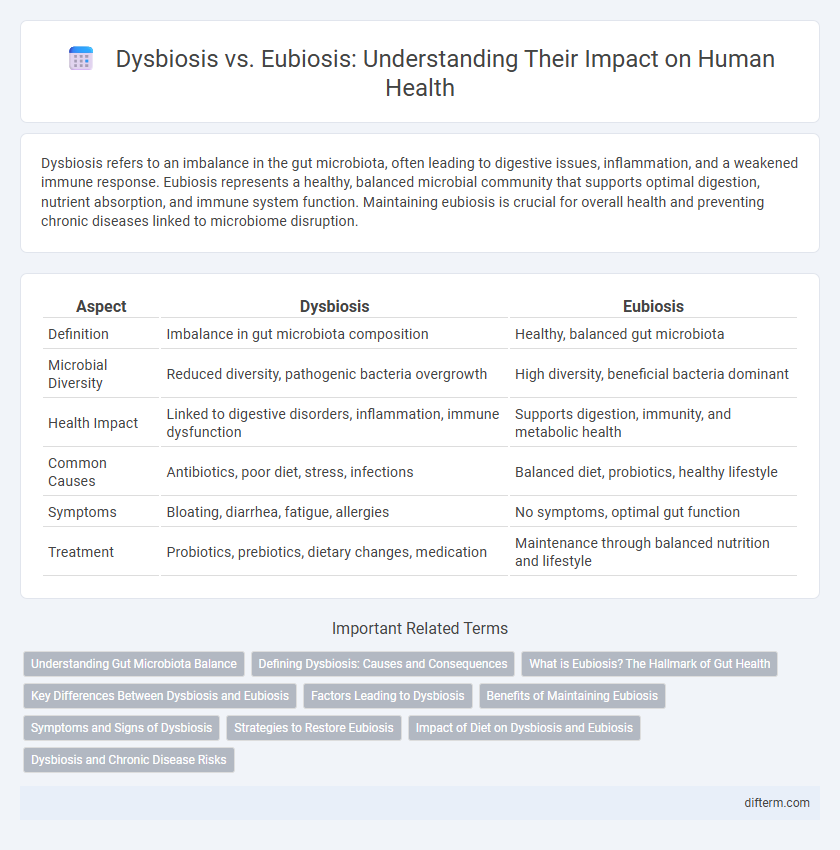Dysbiosis refers to an imbalance in the gut microbiota, often leading to digestive issues, inflammation, and a weakened immune response. Eubiosis represents a healthy, balanced microbial community that supports optimal digestion, nutrient absorption, and immune system function. Maintaining eubiosis is crucial for overall health and preventing chronic diseases linked to microbiome disruption.
Table of Comparison
| Aspect | Dysbiosis | Eubiosis |
|---|---|---|
| Definition | Imbalance in gut microbiota composition | Healthy, balanced gut microbiota |
| Microbial Diversity | Reduced diversity, pathogenic bacteria overgrowth | High diversity, beneficial bacteria dominant |
| Health Impact | Linked to digestive disorders, inflammation, immune dysfunction | Supports digestion, immunity, and metabolic health |
| Common Causes | Antibiotics, poor diet, stress, infections | Balanced diet, probiotics, healthy lifestyle |
| Symptoms | Bloating, diarrhea, fatigue, allergies | No symptoms, optimal gut function |
| Treatment | Probiotics, prebiotics, dietary changes, medication | Maintenance through balanced nutrition and lifestyle |
Understanding Gut Microbiota Balance
Dysbiosis refers to an imbalance in the gut microbiota characterized by reduced microbial diversity and the overgrowth of harmful bacteria, leading to inflammation and digestive disorders. Eubiosis describes a healthy, balanced gut microbiota with diverse beneficial bacteria that support digestion, immune function, and metabolic processes. Maintaining eubiosis promotes optimal gut health, while dysbiosis is often linked to conditions such as irritable bowel syndrome, obesity, and autoimmune diseases.
Defining Dysbiosis: Causes and Consequences
Dysbiosis refers to an imbalance in the gut microbiota, often caused by factors such as antibiotic use, poor diet, stress, and infections. This microbial imbalance disrupts normal digestive functions, leading to symptoms like inflammation, impaired immune response, and increased susceptibility to diseases such as irritable bowel syndrome (IBS) and metabolic disorders. Understanding the causes and consequences of dysbiosis is crucial for developing targeted therapies that restore eubiosis, the state of a balanced and healthy microbial ecosystem.
What is Eubiosis? The Hallmark of Gut Health
Eubiosis represents a balanced and diverse gut microbiota, essential for optimal digestive health and immune function. This state supports efficient nutrient absorption, pathogen resistance, and anti-inflammatory processes, maintaining overall well-being. Disruptions in eubiosis often lead to dysbiosis, associated with gastrointestinal disorders and systemic diseases.
Key Differences Between Dysbiosis and Eubiosis
Dysbiosis refers to the imbalance in the gut microbiota composition, often characterized by reduced microbial diversity and the overgrowth of pathogenic bacteria, leading to inflammation and impaired gut function. Eubiosis represents a healthy, balanced microbial community with optimal microbial diversity, supporting effective digestion, immune regulation, and barrier function of the gut. The key differences lie in microbial diversity, metabolic activity, and the impact on host health, where eubiosis promotes homeostasis while dysbiosis contributes to disease states such as inflammatory bowel disease and metabolic syndrome.
Factors Leading to Dysbiosis
Factors leading to dysbiosis include antibiotic overuse, poor diet high in sugar and processed foods, chronic stress, and infections that disrupt the balance of gut microbiota. Environmental toxins and prolonged inflammation can also alter microbial diversity, impairing gut barrier function and immune responses. Understanding these contributors is essential for restoring eubiosis and maintaining optimal digestive health.
Benefits of Maintaining Eubiosis
Maintaining eubiosis supports a balanced gut microbiota, which enhances immune function and reduces inflammation. Optimal microbial diversity promotes efficient digestion, nutrient absorption, and synthesis of essential vitamins like B12 and K. Stable eubiosis also helps prevent gastrointestinal disorders such as irritable bowel syndrome and reduces the risk of metabolic diseases including obesity and diabetes.
Symptoms and Signs of Dysbiosis
Dysbiosis manifests through symptoms such as bloating, gas, diarrhea, constipation, and abdominal discomfort, indicating an imbalance in gut microbiota. It is often associated with systemic signs like fatigue, skin irritations, and mood disorders due to its impact on the gut-brain axis. These symptoms contrast with eubiosis, where a balanced microbiome supports optimal digestion, immunity, and overall health.
Strategies to Restore Eubiosis
Restoring eubiosis involves targeted probiotic supplementation to rebalance gut microbiota by increasing beneficial bacteria such as Lactobacillus and Bifidobacterium species. Dietary interventions rich in prebiotics like inulin and fructooligosaccharides promote microbial diversity and support the growth of healthy gut flora. Reducing antibiotic overuse and incorporating fermented foods like yogurt and kimchi further enhance microbial equilibrium, improving overall digestive health.
Impact of Diet on Dysbiosis and Eubiosis
Diet plays a crucial role in maintaining eubiosis, the balanced state of gut microbiota, by promoting the growth of beneficial bacteria through high-fiber, nutrient-rich foods. In contrast, dysbiosis, an imbalance in gut microbial communities, often arises from diets high in processed foods, sugars, and unhealthy fats, leading to inflammation and impaired gut barrier function. Optimizing dietary intake with prebiotics, probiotics, and diverse plant-based foods supports microbiome resilience and overall gastrointestinal health.
Dysbiosis and Chronic Disease Risks
Dysbiosis refers to the imbalance of the gut microbiota, characterized by reduced microbial diversity and the overgrowth of pathogenic bacteria. This disruption in the intestinal ecosystem contributes to chronic inflammatory conditions such as inflammatory bowel disease, obesity, type 2 diabetes, and cardiovascular disease. Persistent dysbiosis undermines immune regulation and metabolic function, increasing the risk of developing systemic chronic diseases.
Dysbiosis vs Eubiosis Infographic

 difterm.com
difterm.com